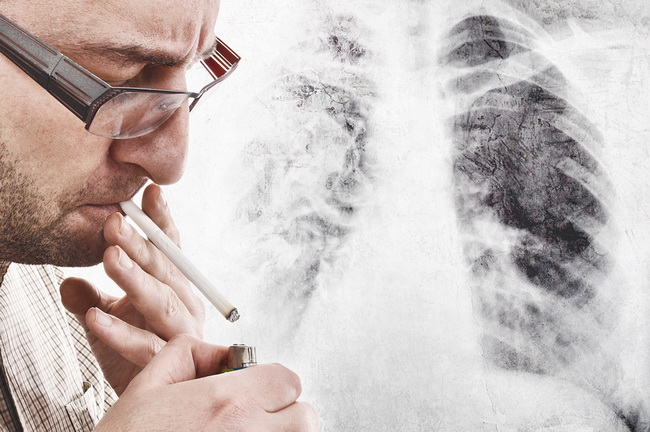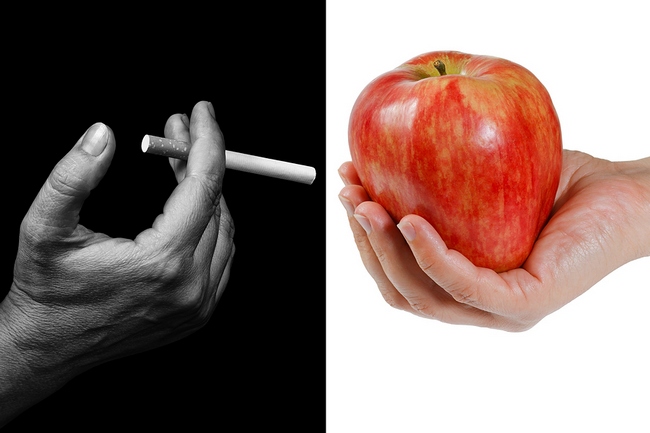- Make It Yourself Lavender Heart-Shaped Bath Bombs!
- 20 Things You Never Knew About “Down There”
- 12 Best Foods For Those Suffering From Arthritis Pain
- 12 Personal Hygiene Mistakes Almost Everyone Makes (Mom Never Told You About #4!)
- 15 Medicinal Plants And Herbs From The Cherokee People
- 12 Mind-Blowing Benefits Of Drinking Coconut Water During Pregnancy
- 12 Outstanding Winter Foods That Won’t Fatten You Up Like A Christmas Turkey
Why Do People Still Smoke After a Cancer Diagnosis?

Photo credit: bigstock
For some of us, this is difficult to understand, but a new study has discovered that about 10 percent of cancer survivors still smoke, some as much as 15 cigarettes every day. You are probably shaking your head right now thinking that these people must have a screw loose or something. After letting cigarettes ruin their lives, how can they not quit? Yep, that’s the right question alright. Cigarettes have been listed as the third most addictive substance in the world but the medications used to stop smoking can give people suicidal thoughts, horrific nightmares, and who needs all that on top of the surgery, chemo, radiation, right?
Although for many smokers, receiving a diagnosis of cancer is the wake-up call they need that gives them the motivation to quit for good but one study, done at Massachusetts General Hospital, which followed lung cancer and colon cancer patients, also showed that of the almost 2500 patients in this study, 14 percent of lung cancer patients and 9 percent of colon cancer patients were still smoking 5 months after their diagnosis.
Unfortunately, doctors, surgeons, and hospitals have diddley squat when it comes to nutritional advice about how to quit. They only offer you surgery or toxic medications. Cancer is simply looking for a damaged body that has been depleted of nutrients and oxygen. Smoking, not only does both of those thing, but it actually reduces the effectiveness of cancer treatments, which will vastly increase the odds that cancer will return.
SEE ALSO: Why You Need to Quit Smoking Now Infographic
This new study was much longer than the one done in Massachusetts and it involved almost 3,000 cancer patients. All subjects were part of the American Cancer Society’s Study of Cancer Survivors and were followed for 9 years after their original diagnosis.
It’s hard to decide if doctors are just naïve or if they are just plain insidious that they don’t blame the smokes themselves, nor the 7,000 chemicals, such as ammonia and pesticides, that go into cigarettes, and that smokers inhale with every puff, for cancer rates. The researchers of this study say that patients need more intervention to quit smoking. Let’s look at what is being done currently.
Continue to Page 2

Photo credit: bigstock
Almost half, 46 percent, of the subjects in this study said that they had wanted to quit, or had tried to quit, but just don’t know how to go about it. The remainder said that they had not made any plans to quit or that they weren’t sure what would happen if they did. (Would they get fat, would they become nervous, etc.) Why aren’t doctors teaching these people about superfoods and behavior modification? Telling someone to quit and then handing them a prescription isn’t enough.
IMPORTANT! 12 Foods That Can Help You Kick the Smoking Habit
According to this study, which was published in the journal Cancer Epidemiology, Biomarkers and Prevention, at least 10 percent of those diagnosed with cancer were still smoking those cancer sticks (cigarettes and/or cigars) nine years later. Those who had received a diagnosis of bladder cancer were the worst offenders with a whopping 17 percent of them still smoking 9 years later. Did their doctors tell them that the additives in cigarettes, such as ammonia and bleach, are also absorbed by the body and come out through their urine? Peeing out those chemicals for years was the most likely cause of their cancer but these subjects most likely think that they “dodged a bullet” because, although they were smoking, they didn’t get lung cancer or mouth cancer. Smoking affects so much more than just your lungs and mouth; did their doctors not tell them this? This information came from a comprehensive cross sectional analysis of data from almost 3,000 cancer survivors.
Research shows that for those who quit smoking after their diagnosis of lung cancer, the overall effectiveness of their treatment is much greater than those who continue to smoke. It also reduces their chances of developing secondary tumors and their chances of survival.
One interesting note here is that, in the case of the Massachusetts study, lung cancer patients who continued to smoke were usually single, did not have their own medical insurance, had higher levels of depression and, no surprise, were likely to be in ill health overall due to a poor diet. Patients who had advanced cases of lung cancer were also much less likely to quit. Researchers attribute this as a reflection that doctors had told patients that quitting smoking would not improve their chances of survival at that stage.
If you don’t want to go out “like that”, and you want to quit smoking, or if you have tried to quit several times but always go back to it, you can actually quit trying to quit! The problem is that these addictive chemicals have overwhelmed and depleted vital nutrients from your body. When you don’t give your body time to restore its nutrient base, many people find that they relapse. To stop smoking the organic way is to stop your daily chemical intake, not just cigarettes, either, but this includes the chemicals in your food, your drinks, the toxic chemicals in your house, and your personal care products. Imagine it’s 100 years earlier and live your life in that manner as much as possible. Of course many people must go to work and some things cannot be avoided, but your diet is one thing in your life that you CAN change. Do what you must and learn how to quit smoking before your body decides to quit all together.
Sources:
http://www.hcplive.com
http://www.dailymail.co.uk
http://www.natureworldnews.com
http://www.14andout.com
http://14andout.blogspot.com
http://www.cancer.org/cancer/news/some-smokers-diagnosed-with-cancer-dont-quit
































DoninAcworthGeorgia
Dec 5, 2014 at 2:11 am
Don’t ever eat this……oh, you should eat that after all but….don’t eat this…….eh, well, guess what…it’s okay now. BUT never ever ever eat this…why, because I don’t want you too! Yes, I can tell you what you should eat all the time….but first…. you must listen to this 39 minute on and on and on lengthy dissertation from me because I like to talk and I’m never going to tell you what TO EAT until you shell out no, not $237.32 and no, not even $172.92 but only $39.93 every month for oh, maybe 17 or 33 years depending on how old you are or when ever I die. Okay here we go…..